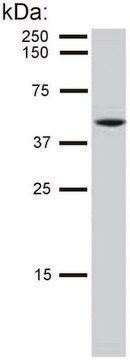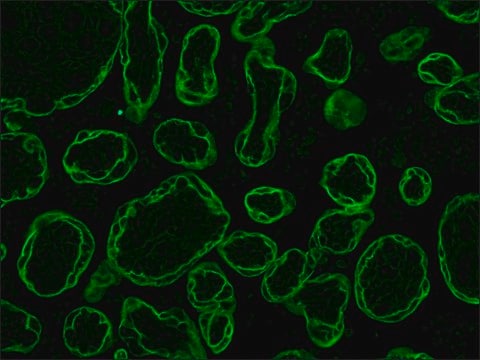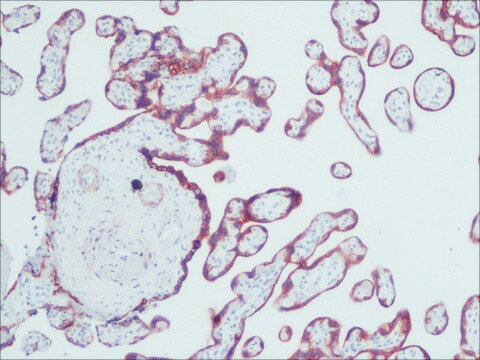推荐产品
生物源
mouse
品質等級
共軛
unconjugated
抗體表格
ascites fluid
抗體產品種類
primary antibodies
無性繁殖
M20, monoclonal
分子量
antigen 52 kDa
包含
15 mM sodium azide
物種活性
feline, human, rabbit, canine, bovine
技術
immunohistochemistry (frozen sections): suitable
indirect immunofluorescence: 1:200 using frozen sections of human or animal tissue
western blot: suitable
同型
IgG1
UniProt登錄號
運輸包裝
dry ice
儲存溫度
−20°C
目標翻譯後修改
unmodified
基因資訊
human ... KRT8(3856)
一般說明
Cytokeratin is a 52.5kD cytoplasmic structural protein that belongs to type II, neutral-to-basic subfamily. It consists of 29 different proteins which is the characteristic of epithelial and trichocytic cells. Monoclonal anti-cytokeratin peptide 8 antibody can be used as a marker for epithelial cell differentiation as well as a tool for tumor identification and classification. It can also be used in western blotting. Mouse anti-cytokeratin peptide 8 antibody reacts specifically with various human simple and complex epithelia like- liver, intestine, pancreas, urinary bladder, salivary gland, thyroid, prostate, mesothel, and placenta but not with stratified squamous epithelia. The product also does not react with non-epithelial tissues (exceptions-certain smooth muscle cells). This product has also shown cross reactivity for cytokeratin of rabbit, cow, dog, and cat.Monoclonal Anti-Cytokeratin 8 (mouse IgG1 isotype) is derived from the M20 hybridoma produced by the fusion of mouse myeloma cells and splenocytes from BALB/c mice immunized with a cytokeratin preparation purified from the human breast carcinoma cell line MCF7.
特異性
Mouse anti-cytokeratin peptide 8 antibody reacts specifically with various human simple and complex epithelia like- liver, intestine, pancreas, urinary bladder, salivary gland, thyroid, prostate, mesothel, and placenta but not with stratified squamous epithelia. The product also does not react with non-epithelial tissues (exceptions-certain smooth muscle cells). This product has also shown cross reactivity for cytokeratin of rabbit, cow, dog, and cat.
免疫原
cytokeratin from human breast carcinoma cell line MCF7.
應用
Monoclonal anti-cytokeratin peptide 8 antibody has been used in
- immunofluorescence microscopy
- immunohistochemistry
- dot blotting
- protein preparation from bovine epithelial cells
- immunofluorescence
- western blotting
生化/生理作用
Monoclonal anti-cytokeratin peptide 8 antibody can be used as a marker for epithelial cell differentiation as well as a tool for tumor identification and classification. It can also be used in western blotting.
免責聲明
Unless otherwise stated in our catalog or other company documentation accompanying the product(s), our products are intended for research use only and are not to be used for any other purpose, which includes but is not limited to, unauthorized commercial uses, in vitro diagnostic uses, ex vivo or in vivo therapeutic uses or any type of consumption or application to humans or animals.
Not finding the right product?
Try our 产品选型工具.
儲存類別代碼
10 - Combustible liquids
閃點(°F)
Not applicable
閃點(°C)
Not applicable
K L Simpson et al.
Cell death & disease, 4, e613-e613 (2013-05-04)
Novel anticancer drugs targeting key apoptosis regulators have been developed and are undergoing clinical trials. Pharmacodynamic biomarkers to define the optimum dose of drug that provokes tumor apoptosis are in demand; acquisition of longitudinal tumor biopsies is a significant challenge
A Bader et al.
Differentiation; research in biological diversity, 68(1), 31-43 (2001-10-31)
In the vertebrate embryo the heart is the first organ to form. Embryonic and extra-embryonic tissues are supposed to contribute to cardiac lineage commitment before and during gastrulation in a paracrine fashion. Evidence has accumulated that factors secreted by the
Mingxi Hua et al.
Journal of cell science, 125(Pt 23), 5800-5810 (2012-09-15)
The correct functioning of hepatocytes requires the establishment and maintenance of hepatocyte polarity. However, the mechanisms regulating the generation of hepatocyte polarity are not completely understood. The differentiation of human fetal hepatic progenitor cells (hFHPCs) into functional hepatocytes provides a
Myoglobin: a promising exogenous reference marker using in proteomics analysis
Wang T, et al.
Food Science and Biotechnology, 22, 393-398 (2013)
Min Hu et al.
American journal of translational research, 10(8), 2696-2705 (2018-09-14)
Polycystic ovary syndrome (PCOS) affects approximately 4%-18% of all reproductive-aged women and is often accompanied by endometrial progesterone (P4) resistance. Endometrial cells from PCOS patients display increased progesterone receptor (PGR) expression; however, in vivo knockout studies and in vitro experiments
我们的科学家团队拥有各种研究领域经验,包括生命科学、材料科学、化学合成、色谱、分析及许多其他领域.
联系技术服务部门








